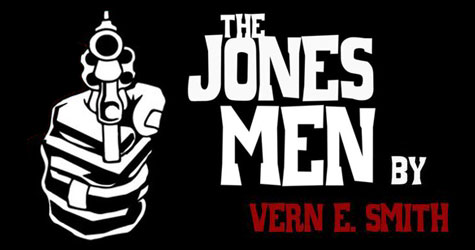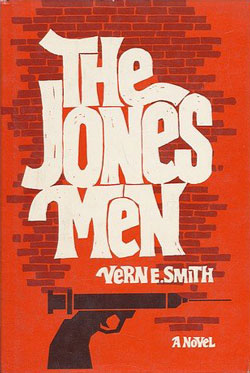
The Jones Men was a thrilling novel to discover. A lost “cult” novel from the 1970s, written by veteran journalist Vern E. Smith, it is a story of the drug trade on the streets of Detroit, and it absolutely blew me away when I read it forty years after its initial publication.
The novel crackles with vibrant characters, juicy dialogue that reads like a mid-70s Blacksploitation film, and a complex, multi-faceted storyline that seems to have come from the pen of a veteran novelist. Not many authors could pull off this feat of parallel storylines, a huge cast of characters, and double cross on top of misdirect on top of misinformation—let alone a first-timer. It’s a stunning work that has been aptly compared to The Wire on many occasions.
So why didn’t Smith ever write another?
Vern Smith was born in Mississippi in 1946. He became a journalist in the late sixties, when, as an African American, he had quite a lot to cover. In 1969, he joined the team at the Independent Press-Telegram in Long Beach, CA, and in 1971, he took a job at Newsweek and was assigned the beat in Detroit, covering the growing drug problem that would later inform his novel.
Smith didn’t plan on writing a novel when he set out onto the streets. “When I first suggested to my editors at Newsweek that we take a look at the devastating impact of heroin on Detroit’s urban landscape back in the early 70s, I knew it was a subject that would draw attention. But I could not have fathomed that I would turn the essence of my reporting into a novel, The Jones Men.”
 Being immersed in the heroin culture of a decaying urban city gave Smith a street-level view of the dealers, addicts, pimps, and prostitutes that swirled around a booming heroin trade. He first turned his observations into an award-winning story for Newsweek. Then, over ten months in 1974, he took his experiences and wrote The Jones Men—his one and only novel.
Being immersed in the heroin culture of a decaying urban city gave Smith a street-level view of the dealers, addicts, pimps, and prostitutes that swirled around a booming heroin trade. He first turned his observations into an award-winning story for Newsweek. Then, over ten months in 1974, he took his experiences and wrote The Jones Men—his one and only novel.
It was in the article that he first used the term Jones Men, but it’s not about a bunch of guys named Jones. The Jones is the craving for heroin, and these men cater to that desire. The novel is sleazy and filled with crooks, bad guys, and scumbags. Yet, you tend to choose sides as you read it.
There is territory up for grabs, and Lennie Jack sees an opportunity to take some. He and his misfit crew hijack a load of heroin and set off a street war that rains havoc over the already torn up city. Vengeance is swift and information is unreliable in Smith’s urban world.
It’s unclear how much real world reporting made its way into the plot of The Jones Men, but the novel has an authenticity about it—the way the men speak, dress, the cars they drive. The men exhibit bravado and boastfulness, hop up on cocaine when they need a jolt, take life as a cheap commodity and disregard it when it stands in the way of them and their money.
There isn’t really a good guy. The women are abused and used. It’s brutal stuff, but surely it’s no more outrageous than the real life Smith saw on the streets of Detroit. The Chicago Tribune said it well in their review: “Not just the facts, but also the smell, feel and terror that the facts alone could never convey.”
Stylistically it shares similarities to another crime classic of the same era, The Friends of Eddie Coyle, with a heavy use of dialogue and a reluctance to over-explain for the reader.
It’s a mystery why Smith didn’t write more. The Jones Men was highly regarded when it came out. It was nominated for an Edgar award in 1975 and was a New York Times notable book, who called it, “A large accomplishment in the art of fiction.”
Smith’s journalism career continued as he covered news of the day from an African American perspective on topics from Hank Aaron’s breaking of Babe Ruth’s home run record to the Atlanta child murders of 1980. He eventually became a national correspondent for Newsweek in 1997.
As a huge fan of The Jones Men, I think it’s a shame Smith never wrote another novel. And, while The Jones Men has its cult of readers, the novel deserves to be more widely known. Any fan of Donald Goines, Chester Himes, or mid ‘70s urban crime films would enjoy The Jones Men.
Smith has hinted that has plans to write more crime novels, but, so far, none have materialized. Until that time, The Jones Men is available now as an ebook and vintage copies are not too hard to come by. Either way, it’s worth your time to find Vern Smith’s one and only novel.
To learn more or order a copy, visit:
opens in a new window![]() opens in a new window
opens in a new window![]() opens in a new window
opens in a new window![]() opens in a new window
opens in a new window![]()
Eric Beetner is the author of more than a dozen novels including Rumrunners, The Devil Doesn't Want Me, Dig Two Graves, Run For The Money, andThe Year I Died Seven Times. His award-winning stories have appeared in over twenty anthologies including Unloaded: Crime Writers Writing Without Guns, which he created and edited. He is co-author (with JB Kohl) of One Too Many Blows To The Head, Borrowed Trouble, and Over Their Heads, and co-wrote The Backlist and The Short List with author Frank Zafiro. He lives in Los Angeles where he co-hosts the Noir At The Bar reading series. For more visit ericbeetner.com

“Stylistically it shares similarities to another crime classic of the same era, The Friends of Eddie Coyle…” Say no more but I’m glad you did because this is new to me and sounds fantastic. Great article, Eric.